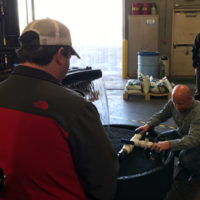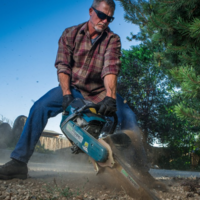
Gone are the days of digging trenches by hand. Now you can dig trenches in a fraction of time using the MiniTrencher GeoRipper. GeoRipper uses two-stroke and four-stroke engines that are specifically designed to work in hostile environments. GeoRippers are designed to minimize downtime thereby maximizing your time on the job. Below are a series of Frequently Asked Questions – answered by GeoRipper and professionals that use a GeoRipper as part of their arsenal of tools. New to the GeoRipper movement? Check out this video on the benefits and features, here.
What about kickback?
When digging in rocky soil, the occasional rock may cause GeoRipper to “bounce.” This bouncing is mostly what typical operators report back to us.
GeoRipper is not a chainsaw. The digging chain moves at about a third of a chainsaw chain. This slower speed, the vibration isolation springs in the arm, and proper operation will not allow the machine to kickback. In rocky soil bouncing may occur which will bring the nose of the digging bar up 2-4″ from contact. As most operators are digging 6-8″ deep, the nose of the bar will not have the opportunity to leave the trench.
Can I trench through tree roots?
Absolutely! GeoRipper’s digging chain is designed specifically to trench through tree roots up to 3″ in diameter and below grade. Our digging chains are self-sharpening. It may take 10-20 minutes of digging in soil before the teeth are ready to chip through roots. GeoRipper is not a chainsaw and shall not perform like one. Chipping through large tree roots takes patience. It will not move through large tree roots as fast as a chainsaw.
Can I dig through rocks?
GeoRipper will not dig through solid rock or concrete. It will dig up loose rock about the size of an adult fist. A up and down “sawing” action will help to bring up the larger, fist-sized, rocks, otherwise GeoRipper will dig up and expel smaller rocks with ease.
Larger rocks should and can easily be avoided and the operator can return with a rock bar to pry the larger rocks from the ground.
How deep does GeoRipper trench?
That depends on your model. GR16 models can trench up to 16″ deep. This is easily done in combination with EZ Kart. If trenching by hand, 12-14″ is comfortable. GR20 models can trench up to 20″ deep. This is easily done in combination with EZ Kart. If trenching by hand, 18″ is comfortable. GR27 models can trench up to 27″ deep. This is easily done in combination with EZ Kart. If trenching by hand, 24″ is possible. EZ Kart comes standard with all GR27 models. It is recommended to use EZ Kart when operating GR27 models.
Can I buy parts to convert my existing demo saw?
GeoRipper does not fit any chainsaw on the market. There are kits for specific Makita, Stihl and Husqvarna demo saws.
How long does a digging chain last?
According to MiniTrencher, the national average for GeoRipper digging chains is roughly 1,000 – 3,000 lineal feet. Digging life is determined by three factors: Digging depth, Soil type, and Operator. Like any piece of power equipment, there is a learning curve. Once the operator is familiar and comfortable with the machine, chain life might increase. Your results may vary. But never fear! we include 2 chains with each machine to allow for the learning curve. Just make sure to buy before you run out!
Is it easy to operate?
Yes! But, there is a learning curve to operating a GeoRipper. Once you’re used to not over-throttling the machine, it’s smooth sailing. The GeoRipper works best at 1/2 to 3/4 throttle. Running at less throttle is easier. If you are not comfortable operating by hand for any reason, consider purchasing the EZ Kart. An EZ Kart will allow you to operate the machine without having to hold the weight of the machine.
Are there safety concerns with GeoRipper?
Like all power equipment, if it’s not used correctly and respectfully, it can be dangerous. Once the machine is digging in the ground, the risk of injury is reduced. As always, we recommend proper PPE to be worn when operating a GeoRipper or any other piece of power equipment. This includes: a face shield, ear protection, work gloves, and safety-toe boots. If operating a GeoRipper in rocky soil or gravel, shin guards are recommended.







